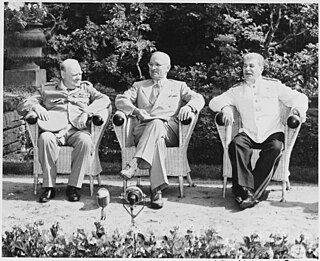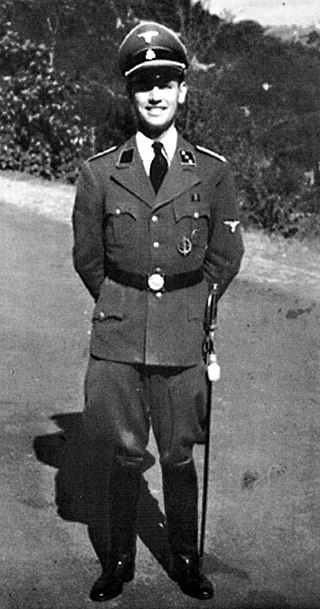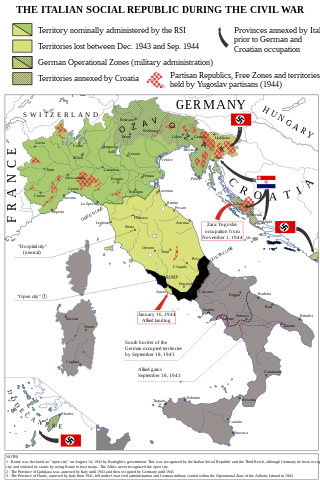Related Research Articles

Konrad Hermann Joseph Adenauer was a German statesman who served as the first chancellor of the Federal Republic of Germany from 1949 to 1963. From 1946 to 1966, he was the first leader of the Christian Democratic Union (CDU), a newly founded Christian-democratic party, which became the dominant force in the country under his leadership.

The Potsdam Conference was held at Potsdam in the Soviet occupation zone from July 17 to August 2, 1945, to allow the three leading Allies to plan the postwar peace, while avoiding the mistakes of the Paris Peace Conference of 1919. The participants were the Soviet Union, the United Kingdom, and the United States. They were represented respectively by General Secretary Joseph Stalin, Prime Ministers Winston Churchill and Clement Attlee, and President Harry S. Truman. They gathered to decide how to administer Germany, which had agreed to an unconditional surrender nine weeks earlier. The goals of the conference also included establishing the postwar order, solving issues on the peace treaty, and countering the effects of the war.

The history of Germany from 1945 to 1990 comprises the period following World War II. The period began with the Berlin Declaration, marking the abolition of the German Reich and Allied-occupied period in Germany on 5 June 1945, and ended with the German reunification on 3 October 1990.

War reparations are compensation payments made after a war by one side to the other. They are intended to cover damage or injury inflicted during a war. War reparations can take the form of hard currency, precious metals, natural resources, industrial assets, or intellectual properties. Loss of territory in a peace settlement is usually considered to be distinct from war reparations.

Erich Priebke was a German mid-level SS commander in the SS police force (SiPo) of Nazi Germany. In 1996, he was convicted of war crimes in Italy for commanding the unit which was responsible for the Ardeatine massacre in Rome on 24 March 1944 in which 335 Italian civilians were killed in retaliation for a partisan attack that killed 33 men of the German SS Police Regiment Bozen. Priebke was one of the men held responsible for this mass execution. After the defeat of Nazi Germany, he fled to Argentina, where he lived for almost 50 years.

The Foreign Sovereign Immunities Act of 1976 (FSIA) is a United States law, codified at Title 28, §§ 1330, 1332, 1391(f), 1441(d), and 1602–1611 of the United States Code, that established criteria as to whether a foreign sovereign state is immune from the jurisdiction of the United States' federal or state courts. The Act also establishes specific procedures for service of process, attachment of property and execution of judgment in proceedings against a foreign state. The FSIA provides the exclusive basis and means to bring a civil suit against a foreign sovereign in the United States. It was signed into law by United States President Gerald Ford on October 21, 1976.
The Reparations Agreement between Israel and the Federal Republic of Germany was signed on September 10, 1952, and entered in force on March 27, 1953. According to the Agreement, West Germany was to pay Israel for the costs of "resettling so great a number of uprooted and destitute Jewish refugees" after the war, and to compensate individual Jews, via the Conference on Jewish Material Claims Against Germany, for losses in Jewish livelihood and property resulting from Nazi persecution.

Wiedergutmachung refers to the reparations that the German government agreed to pay in 1953 to the direct survivors of the Holocaust, and to those who were made to work at forced labour camps or who otherwise became victims of the Nazis. The sum would amount, through the years, to over 100 billion Deutsche Mark. Historian Tony Judt writes about Wiedergutmachung:
In making this agreement Konrad Adenauer ran some domestic political risk: in December 1951, just 5 percent of West Germans surveyed admitted feeling ‘guilty’ towards Jews. A further 29 percent acknowledged that Germany owed some restitution to the Jewish people. The rest were divided between those who thought that only people ‘who really committed something’ were responsible and should pay, and those who thought ‘that the Jews themselves were partly responsible for what happened to them during the Third Reich.’ When the restitution agreement was debated in the Bundestag on March 18th 1953, the Communists voted against, the Free Democrats abstained and both the Christian Social Union and Adenauer’s own CDU were divided, with many voting against any Wiedergutmachung (reparations).

The Distomo massacre was a Nazi war crime which was perpetrated by members of the Waffen-SS in the village of Distomo, Greece, in 1944, during the German occupation of Greece during World War II.

Switzerland is not a member state of the European Union (EU). It is associated with the Union through a series of bilateral treaties in which Switzerland has adopted various provisions of European Union law in order to participate in the Union's single market, without joining as a member state. Among Switzerland's neighbouring countries, all but one are EU member states.
The World Jewish Congress lawsuit against Swiss banks was launched in 1995 to retrieve deposits made into the three largest Swiss banks by victims of Nazi persecution during and prior to World War II. WJC negotiations were initiated with the Government of Switzerland and Swiss banks, and later expanded to cover Swiss insurance companies, over burdensome proof-of-ownership requirements for accounts and insurance policies. Strong support from both federal and state United States politicians and officials, threats of sanctions against the three Swiss banks, as well as leaked documents from a bank guard pressured a settlement of the suit in 1998 in a U.S. court for multiple classes of people affected by government and banking practices. The Swiss government itself was not a signatory to the deal. As of early 2020, US$1.29 billion has been disbursed to approximately 458,400 claimants.
The expulsion of Germans from Czechoslovakia after World War II was part of a series of evacuations and deportations of Germans from Central and Eastern Europe during and after World War II.
Reparations were paid to Yugoslavia in the aftermath of World War II. The State Reparations Commission of the Yugoslav Government estimated the total war damages inflicted upon Yugoslavia in World War II at approximately US$47 billion.

Bilateral foreign relations exist between Austria and Israel. The fact that Adolf Hitler and other perpetrators of The Holocaust came from Austria gives the relationship between the two countries a special relevance. At the same time, the founder of Zionism, Theodor Herzl, also lived in Austria-Hungary and many Israelis are descendants of Austrian Jews. After the founding of Israel, the Second Austrian Republic recognized the Jewish state of Israel shortly after its founding in 1949, before official diplomatic relations were established in 1956. In the 1970s, Bruno Kreisky sought a role as mediator in the Middle East conflict and called for a Palestinian state, which caused disputes with the Israelis. Relations were later strained by the Waldheim affair in the 1980s and the first FPÖ government participation in 2000. After that, the two countries became close allies and established friendly relations. In 2023, Foreign Minister Alexander Schallenberg announced “we have entered into a strategic, extremely close relationship with Israel that can no longer be undone”. Within the EU, Austria is considered one of the most pro-Israeli countries.
After World War II, both the Federal Republic and Democratic Republic of Germany were obliged to pay war reparations to the Allied governments, according to the Potsdam Conference. Other Axis nations were obliged to pay war reparations according to the Paris Peace Treaties, 1947. Austria was not included in any of these treaties.

Jurisdictional Immunities of the State was a case concerning the extent of state immunity before the International Court of Justice. The case was brought by Germany after various decisions by Italian courts to ignore the state immunity of Germany when confronted with claims against Germany by victims of Nazi-era war crimes. The court found that Italy was wrong to ignore German immunity, and found that Italy was obligated to render the decisions of its courts against Germany without effect.

The victim theory, encapsulated in the slogan "Austria – the Nazis' first victim", was the 1949–1988 Austrian ideological basis formed by Austrians themselves under Allied occupation and independent Second Austrian Republic. According to the founders of the Second Austrian Republic, the 1938 Anschluss was an act of military aggression by the Third Reich. Austrian statehood had been interrupted and therefore the newly revived Austria of 1945 could not and should not be considered responsible for the Nazis' crimes in any way. The "victim theory" that had formed by 1949 insisted that all of the Austrians, including those who strongly supported Adolf Hitler, had been unwilling victims of the Nazi regime and were therefore not responsible for its crimes.

The Padule di Fucecchio massacre was the murder of at least 174 Italian civilians, carried out by the 26th Panzer Division at Padule di Fucecchio, a large wetland north of Fucecchio, Tuscany, on 23 August 1944. After the war, the commander of the 26th Panzer Division was sentenced for war crimes, but the men who carried out the massacre were not convicted until 2011 and none served any jail time. The massacre has been described as "one of the worst Nazi atrocities in Italy".

Two of the three major Axis powers of World War II—Nazi Germany and their Fascist Italian allies—committed war crimes in the Kingdom of Italy.
Federal Republic of Germany v. Philipp, 592 U.S. ___ (2021), was a United States Supreme Court case that dealt with the applicability of the Foreign Sovereign Immunities Act (FSIA) for heirs of victims of the Holocaust to sue Germany in the United States court systems for compensation for items that were taken by the Nazi Party during World War II. At issue in the case was whether claims fell within the FSIA's exception to sovereign immunity for “property taken in violation of international law,” 28 U.S.C. §1605(a)(3), given that the sovereign here was alleged to have engaged in a taking of its own nationals’ property; and whether courts can invoke the doctrine of international comity under the FSIA to abstain from exercising jurisdiction based on prudential considerations. In a unanimous opinion by Chief Justice Roberts, the Court held that FSIA does not allow these survivors to sue Germany in U.S. court, as the sale was an act of expropriation of property rather than an act of genocide, though other means of recovery are still potentially available.
References
- 1 2 3 "Bilateral Agreements and the Cold War (1956 - 1974)". German Federal Archives . Retrieved 21 August 2018.
- 1 2 3 "Claims Agreements with other Countries". Institute for Jewish Policy Research . Retrieved 21 August 2018.
- ↑ Squires, Nick (26 May 2011). "Three former Nazi soldiers found guilty of Tuscan massacre". The Daily Telegraph . Archived from the original on 8 March 2012. Retrieved 17 August 2018.
- ↑ "Three ex-Nazis get life for WWII massacre". Agenzia Nazionale Stampa Associata . 26 May 2011. Retrieved 17 August 2018.
- ↑ "Compensation for National Socialist injustice". Federal Foreign Office . Retrieved 24 August 2018.